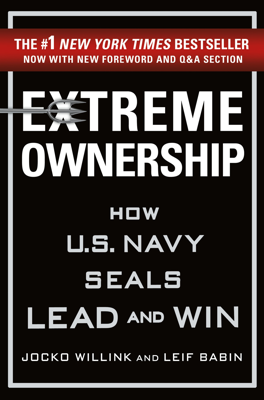Summary
Extreme Ownership: How U.S. Navy SEALs Lead and Win by Jocko Willink and Leif Babin
Summary Overview
"Extreme Ownership" delves into the principles of leadership gleaned from U.S. Navy SEAL experiences, applying these lessons to business and life. The central ethos revolves around the concept of Extreme Ownership, where leaders bear full responsibility for their teams and failures, learning to foster trust, accountability, and effectiveness. Here's a concise encapsulation of several key principles discussed:
Extreme Ownership
Leaders must own every aspect of their responsibilities and blame no one else. This concept is vividly illustrated through a "blue-on-blue" fire incident in Ramadi, where author Jocko Willink, the SEAL unit commander, takes full responsibility, emphasizing the significance of this principle both in combat and business settings.
No Bad Teams, Only Bad Leaders
Leadership fundamentally determines a team's success. The swapping of boat crew leaders during SEAL training demonstrated how effective leadership transforms poor performers into winners.
Believe
Leaders should fully believe in a mission to lead effectively. Willink navigates initial skepticism when working with less capable Iraqi forces, embracing the belief in the strategic goals to lead his team powerfully.
Check the Ego
Ego can sabotage objectives and teamwork. Illustrating this, Willink points out the necessity of humility and sacrifice for the greater mission, especially seen when different U.S. military units collaborate in combat without letting pride interfere.
Cover and Move
Fundamental to military tactics and relevant in business, Cover and Move signifies mutual support among teams, ensuring team synergy and combined strength in facing challenges.
Simple
Willink asserts that simplicity in planning enhances operational effectiveness. Complex plans can confuse and complicate execution, especially under stress.
Prioritize and Execute
In chaotic circumstances, leaders must prioritize tasks and execute them systematically. This principle helps to address the most critical issues first, preventing overwhelming situations.
Decentralized Command
Leaders should empower subordinates to lead in their scopes, enabling agile and effective decision-making under the commanding leader's intent.
Plan
Good planning involves clear, detailed, and understandable missions with contingencies. Effective planning ensures everyone knows their roles and can execute accordingly.
Leading Up and Down the Chain of Command
Leaders must communicate effectively both with their superiors and subordinates, ensuring alignment and understanding throughout the organization.
Decisiveness amid Uncertainty
Leaders must act with the best information available and adjust as more details emerge, avoiding paralysis by overanalysis.
Discipline Equals Freedom—The Dichotomy of Leadership
Willink describes the balance leaders must maintain; discipline in processes allows freedom in operations, highlighting that leadership requires managing contradictory qualities for effectiveness.
Each chapter roots these principles in combat stories transitioning them into business and life lessons. The book underlines the universal application of these leadership tenets, advocating for a leadership style centered on responsibility, simplicity, and decisive action.
